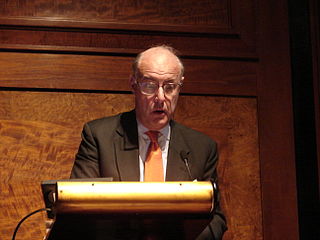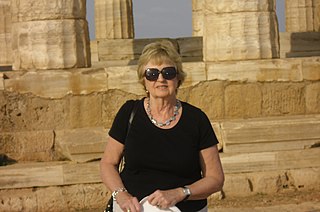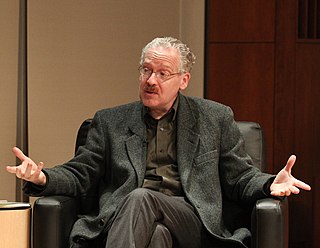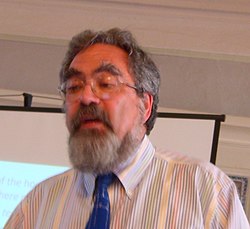
Stephen Jay Greenblatt is an American Shakespearean, literary historian, and author. He has served as the John Cogan University Professor of the Humanities at Harvard University since 2000. Greenblatt is the general editor of The Norton Shakespeare (2015) and the general editor and a contributor to The Norton Anthology of English Literature.

AgnoloAmbrogini, commonly known as Angelo Poliziano or simply Poliziano, anglicized as Politian, was an Italian classical scholar and poet of the Florentine Renaissance. His scholarship was instrumental in the divergence of Renaissance Latin from medieval norms and for developments in philology. His nickname Poliziano, by which he is chiefly identified to the present day, was derived from the Latin name of his birthplace, Montepulciano.
Quentin Robert Duthie Skinner is a British intellectual historian. He is regarded as one of the founders of the Cambridge School of the history of political thought. He has won numerous prizes for his work, including the Wolfson History Prize in 1979 and the Balzan Prize in 2006. Between 1996 and 2008 he was Regius Professor of History at the University of Cambridge. He is the Emeritus Professor of the Humanities and Co-director of The Centre for the Study of the History of Political Thought at Queen Mary University of London.
Arnaldo Dante Momigliano, KBE, FBA was an Italian historian of classical antiquity, known for his work in historiography, and characterised by Donald Kagan as "the world's leading student of the writing of history in the ancient world".

Sir David Nicholas Cannadine is a British author and historian who specialises in modern history, Britain and the history of business and philanthropy. He is currently the Dodge Professor of History at Princeton University, a visiting professor of history at Oxford University, and the editor of the Oxford Dictionary of National Biography. He was president of the British Academy between 2017 and 2021, the UK's national academy for the humanities and social sciences. He also serves as the chairman of the trustees of the National Portrait Gallery in London and vice-chair of the editorial board of Past & Present.

Lisa Anne Jardine was a British historian of the early modern period.

Dame Averil Millicent Cameron, often cited as A. M. Cameron, is a British historian. She writes on Late Antiquity, Classics, and Byzantine Studies. She was Professor of Late Antique and Byzantine History at the University of Oxford, and the Warden of Keble College, Oxford, between 1994 and 2010.

Lorraine Daston is an American historian of science. Director emerita of the Max Planck Institute for the History of Science (MPIWG) in Berlin, and visiting professor in the Committee on Social Thought at the University of Chicago, she is an authority on Early Modern European scientific and intellectual history. In 1993, she was named a fellow of the American Academy of Arts and Sciences. She is a permanent fellow at the Berlin Institute for Advanced Study.
Hans Baron was a German-American historian of political thought and literature. His main contribution to the historiography of the period was to introduce in 1928 the term civic humanism.
Simon E. Gikandi is a Kenyan Literature Professor and Postcolonial scholar. He is the Class of 1943 University Professor of English at Princeton University. He is perhaps best known for his co-editorship of The Cambridge History of African and Caribbean Literature. He has also done important work on the modern African novel, and two distinguished African novelists: Chinua Achebe and Ngũgĩ wa Thiong'o. In 2019 he became the president of the Modern Language Association.
Theodore K. Rabb was an American historian specializing in the early modern period of European history. He was a Professor Emeritus in the Department of History at Princeton University. He was one of the leading scholars in the field of 16th- and 17th-century Europe, focusing on varying topics such as climate history and food history.
Seth Lerer is an American scholar and Professor of English. He specializes in historical analyses of the English language, and in addition to critical analyses of the works of several authors, particularly Geoffrey Chaucer. He is a Distinguished Professor Emeritus of Literature at the University of California, San Diego, where he served as the Dean of Arts and Humanities from 2009 to 2014. He previously held the Avalon Foundation Professorship in Humanities at Stanford University. Lerer won the 2010 Truman Capote Award for Literary Criticism and the 2009 National Book Critics Circle Award in Criticism for Children’s Literature: A Readers’ History from Aesop to Harry Potter.
John Kinder Gowran Shearman was an English art historian who also taught in America. He was a specialist in Italian Renaissance painting, described by his colleague James S. Ackerman as "the leading scholar of Italian Renaissance painting", who published several influential works, but whose expected major book on Quattrocento painting, for the Penguin/Yale History of Art series, never appeared. However, what is widely acknowledged as his most influential book, on the concept of Mannerism, published in 1967, is still in print.

Roger Chartier,, is a French historian and historiographer who is part of the Annales school. He works on the history of books, publishing and reading. He teaches at the École des Hautes Études en Sciences Sociales in Paris, the Collège de France, and the University of Pennsylvania.
Ann M. Blair is an American historian, and the Carl H. Pforzheimer University Professor at Harvard University. She specializes in the cultural and intellectual history of early modern Europe, with an emphasis on France. Her interests include the history of the book and of reading, the history of the disciplines and of scholarship, and the history of interactions between science and religion. She is most widely known for being the author of the bestselling book Too Much to Know: Managing Scholarly Information before the Modern Age (2010). Blair was elected to the American Philosophical Society in 2009.

Lawrence M. Principe is the Drew Professor of the Humanities at Johns Hopkins University in the Department of History of Science and Technology and the Department of Chemistry. He is also currently the Director of the Charles Singleton Center for the Study of Premodern Europe, an interdisciplinary center for research at Johns Hopkins. He is the first recipient of the Francis Bacon Medal for significant contributions to the history of science. Principe's research has been supported by the National Science Foundation, the National Endowment for the Humanities, the American Philosophical Society, the Chemical Heritage Foundation, and a 2015-2016 Guggenheim Fellowship. Principe is recognized as one of the foremost experts in the history of alchemy.
Jan Ziolkowski occupies the Arthur Kingsley Porter Professorship of Medieval Latin at Harvard University. From 2007 to 2020 he served as Director of the Dumbarton Oaks Research Library and Collection. His scholarship has focused on the literature, especially in Latin, of the Middle Ages.

James Hankins is an American intellectual historian specializing in the Italian Renaissance. He is the General Editor of the I Tatti Renaissance Library and the Associate Editor of the Catalogus Translationum et Commentariorum. He is a professor in the History Department of Harvard University. In Spring 2018, he is a Visiting Research Fellow at the University of Notre Dame Center for Ethics and Culture.

William R. Newman is Distinguished Professor and Ruth N. Halls Professor in the Department of History and Philosophy of Science at Indiana University. Most of Newman’s work in the History of Science has been devoted to alchemy and "chymistry," the art-nature debate, and matter theories, particularly atomism. Newman is also General Editor of the Chymistry of Isaac Newton, an online resource combining born-digital editions of Newton’s alchemical writings with multimedia replications of Newton’s alchemical experiments. In addition, he was Director of the Catapult Center for Digital Humanities and Computational Analysis of Texts at Indiana University. Newman is on the editorial boards of Archimedes, Early Science and Medicine, and HOPOS.
Carla Mazzio, an American literary and cultural critic, specializes in early modern literature in relationship to the history of science, medicine, and health, the history of language, media technologies, and the printed book, and the history of speech pathologies with a focus on the harmful social construction of the “inarticulate” person or community. Her research has been supported by the Guggenheim Foundation, the National Endowment for the Humanities, and the Radcliffe Institute for Advanced Study at Harvard University.










